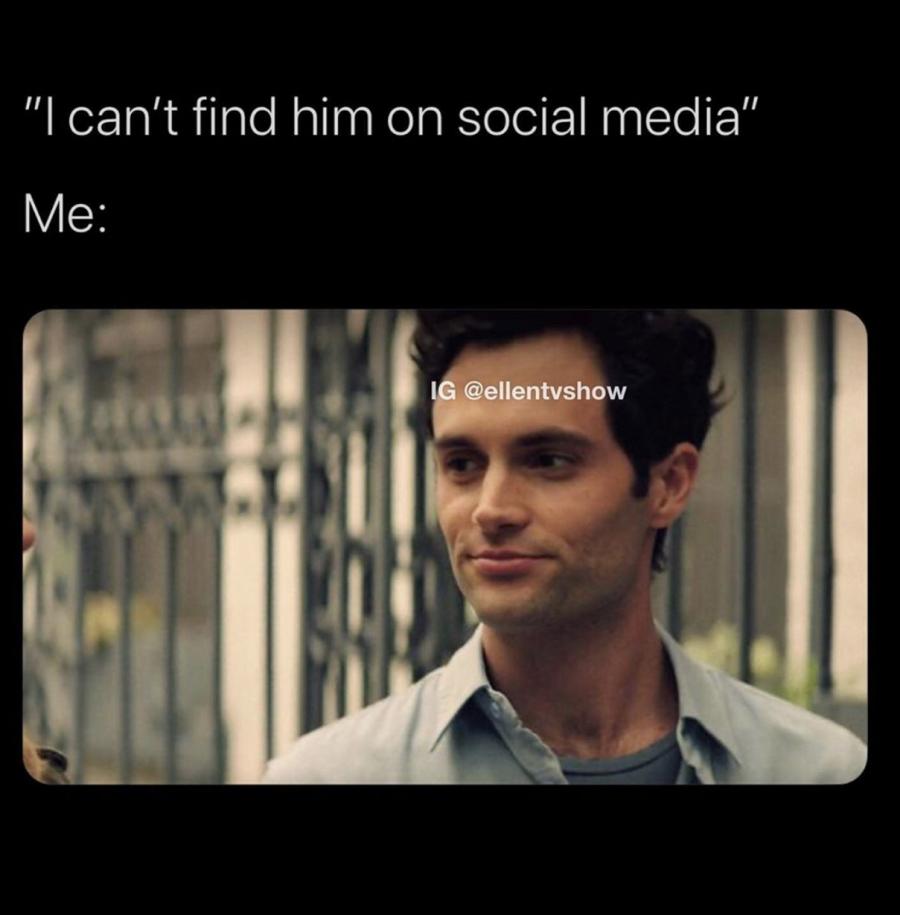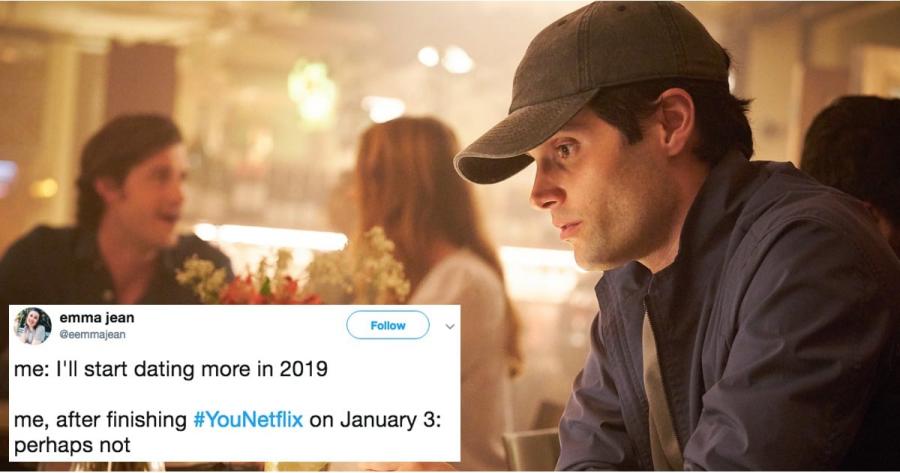
The Netflix series ‘You’ and the new stalking structures of ‘being social’
‘You' is the new popular series on Netflix. The series follows Joe Goldberg, a New Yorker who seeks to win over the heart of Beck, the girl he is madly in love with. He is obsessed with her, and nourishes his obsession through social media and other technologies. This makes it possible for him to track her every move. Are online platforms stimulating this kind of behavior?
The series 'You'
The first season revolves around Joe, a book store manager, stalking a woman. Joe is presented as falling in love with one of his customers in the book shop, Guinevere Beck. Guinevere Beck is an ambitious woman aspiring to become a great writer. Joe stalks Beck online through social media and other technological devices and wants to remove all obstacles that might stand in the way of a relationship with Beck. In his pursuit of Beck, multiple people end up dead.
In what follows, I will focus on the stalker behavior represented in season 1 of the series, as Joe actively stalks Beck. This behavior is possible in real life due to new technologies and social media. Are online platforms partly responsible for this kind of behavior? I will address this question by specifically analyzing Joe's stalking behaviors.

'YOU' on Netflix
Firstly, finding Beck was quite easy. Joe knew her name through the credit card she used for purchasing books in his store. In addition, all of Beck social media accounts are public. Simultaneously, Joe both wants to make sure Beck is ‘safe’, while he himself, is creating danger in Beck's life. With only a few clicks, Joe finds out about her family, where she grew up, and that her parents are divorced. In his online searches, he finds her address. He goes to her home where he begins to follow her and learns her daily routine. In his obsession, Joe is afraid that others will hurt or stalk Beck. They start dating, all the while Joe begins to remove all the obstacles and threats to their relationship.
They start dating, all the while Joe begins to remove all the obstacles and threats to their relationship.
After finding her initial information online, the stalking continues. Joe finds out a couple of details of Beck’s life he does not like. He discovers Beck is seeing another man, Benji, and believes he is a threat to their relationship. Joe invites Benji for a ‘business meeting’ and kills him. Joe continues stalking Beck through her old phone as he stole Beck’s phone in the beginning of their relationship and has access to all her social platforms.
Joe stalks Beck’s best friend too, Peach. By keeping tabs on Peach, Joe finds that not only is she also stalking Beck, she's in love with her. This gives Joe enough reason to get rid of Peach and he kills her. Beck ends the relationship with Joe because he doesn't trust her. Joe does not trust Beck because of her therapist, who he deems another threat to their relationship. Beck uncovers some clues online and in his home and realizes Joe is not who he says he is. She finds out he murdered his ex-girlfriend. Joe has no other choice, he has to protect himself from Beck. He locks Beck up in his cage, along with his secret.

Meme 'YOU'
From dating trends to stalking, where is the distinction? Stalking is defined as: ‘’Unwanted and/or repeated surveillance by an individual or group toward another person.’’ Cyberstalking can be described with the same definition but only through the use of electronic devices. In ‘You’, Joe's stalking actions are a combination of stalking and cyberstalking. Joe is stalking Beck both online and offline. He constantly checks Beck’s messages, emails, and keeps track of her plans. Beck has no idea she is being watched.
Stalking someone usually happens without the subject being aware of it, and searching for information about others online is now everyday behavior. To give an example of seemingly acceptable behavior, on their first date Beck admits she ‘googled’ Joe. In the series, they act like it is normal to ‘google’ someone before going on a date. This example provides a clear distinction between stalking and superficial research.
Users' choices
If you know where someone is from, where he/she works, or who his/her friends are, you might be able to easily find someone online, specifically on social media. There is a difference between an open or a closed account. For example, with an open account on Instagram, you can look at someone’s account without him/her knowing it. With a closed, or private, account, a user has to accept you following him/her viewing their profile is more difficult. When someone uses his or her whole name on several accounts, they are easily searchable. With both kinds of account settings, users have the option to block followers. For Joe, Beck is easy to find. She uses her real name on her accounts, and her information is easy to search for.
Cyberstalking can lead to offline stalking due to all the information available online
Another factor to consider is the way people share their information on social media. Platforms encourage people to share and enable three types of sharing (van Dijck, 2013):
- Firstly, platforms encourage users to share with one another.
- Secondly, they share users' information with third parties, such as advertisers.
- Finally, there is frictionless sharing, which is another way of encouraging users to share: it refers to being able to share data between platforms, for example, Instagram to Facebook. Frictionless sharing makes it easier for users to share content from one platform to another.
In the series, Beck is active on several platforms; Facebook, Instagram, Twitter and her email. Joe is able to trace Beck because of her interactional way of sharing on social media. Joe was able to find her on every single platform and gain a deeper understanding of her life. Sharing your life on platforms and making a lot known about yourself can be dangerous, as you can see in ‘You’. In the series, Beck thinks she has nothing to hide and believes it is okay to make her social media accounts public. Making your account public and actively sharing your everyday life can potentially be dangerous. This allows people to take advantage of your public information online - which Joe does. People stalking for numerous reasons and they may follow different strategies. In the series, the stalking begins with online research, finding out who someone is, who their friends are, where they come from, what they do, and so on. Joe is able to find Beck's address online which leads him to stalk her offline as well. Cyberstalking can lead to offline stalking due to all the information available online.

Meme 'YOU'
'Being social' on social media
Sharing about oneself and being findable on social media platforms is all part of being ‘social’. On social media, being social ‘‘encompasses both (human) connectedness and (automated) connectivity’’ (van Dijck, 2013). Human input will end up in machined output. Humans, users of social media, share pictures, activities, data, and so on. This data will be shaped by algorithms and data mechanisms and result in a machined output. Hence, while platforms encourage users to be more 'social', van Dijck (2013) proposes that instead of 'social' media we should rather call them 'connective' media.
The machine-generated output is researchable and findable for others, including stalkers. In ‘You’, Joe takes advantage of the data he finds about Beck through the use of online platforms. The platforms make it possible for people to have a lot of information about one another. With stalking with the help of these platforms, people take advantage of the data of other users.
In 'You', Joe takes advantage of the data he finds about Beck through the use of online platforms.
Online platforms encourage users to have higher levels of publicity. This is part of platforms being mediators according to van Dijck (2013). Platforms are mediators rather than intermediaries: ''Borrowing terminology from actor-network theory, a platform is a mediator rather than an intermediary: it shapes the performance of social acts instead of merely facilitating them.’’ (van Dijck, 2013). Platforms are shaping our activity online, and they do not take users' privacy seriously. This results in less specific privacy settings and some information of users being public by default. Such defaults influence people's behavior online, according to van Dijck (2013). Platforms not taking privacy settings seriously is connected to the possibilities of stalking behavior when users do not have a lot of choices regarding their privacy settings and their choices on these platforms are enforced and influenced by the platforms.
'You' shows us the risks involved with the use of platforms and thus the defaults of users' privacy. Van Dijck (2013) emphasizes the responsibility of the platform in the vulnerability of its users. 'You' shows us what van Dijck means with the concept; Beck is vulnerable because of her shaped online behavior. Joe takes advantage of Beck's situation and stalks her through the affordances of these platforms. Joe discovers a lot of private information through thorough research on all of Beck's accounts. Joe discovers all personal information through the use of social media and all the platforms Beck is active on. Hence, platforms offer a way to stimulate 'being more social' which makes users more vulnerable for different degrees of stalking.
To conclude
Stalking is made possible in new ways in our society, online and offline. In the series 'You', Joe begins with cyberstalking and through the information, he has obtained online, he starts stalking Beck in her daily life. Not only users are responsible for their sharing culture. Platforms stimulate sharing in many different ways and also play a role in our sharing culture. In the case of stalking, it is the users who take advantage of the sharing culture, not the platforms. However platforms are mediators in users' social activities online. They influence people in their privacy settings. Users do not have a lot of choice concerning their own privacy. Platforms are stimulating users with the lack of various settings to be more 'social' and share more. This lack of options is connected to the new possibilities for stalking behavior online, as more and more information is available about us online. When it comes to stalking, the series ‘You’ is seen as a reflection of this reality.
References
Bacon, J. (2017, September 20). How online dating won the heart of the nation. Retrieved December 28, 2019.
Bijl, M. (2019, October 29). Dating apps as part of our culture. Retrieved January 8, 2020.
Gillespie, T. (2018). Custodians of the Internet: Platforms, Content Moderation, and the Hidden Decisions That Shape Social Media. New Haven: Yale University Press.
Leetaru, K. (2018, November 24). Should Social Media Be Held Responsible For The Atrocities And Deaths It Facilitates? Retrieved January 3, 2020, from https://www.forbes.com/sites/kalevleetaru/2018/11/23/should-social-media...
van Dijck, J. (2013). The Culture of Connectivity: A Critical History of Social Media (1st ed.). Oxford: Oxford University Press.